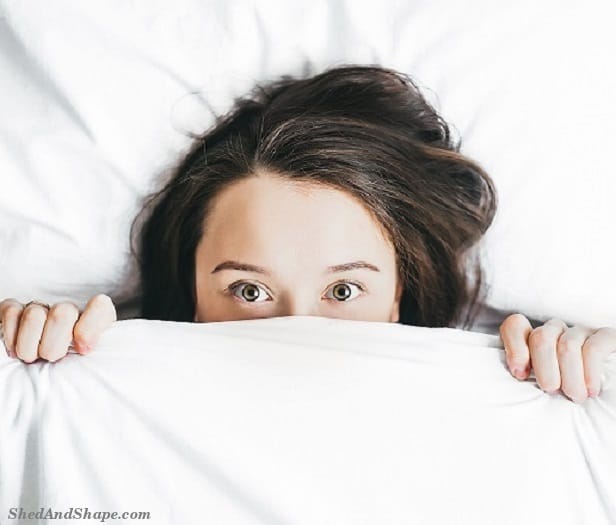Insomnia is one of the most habitually reported sleep problems. One out of four people has some insomnia symptoms, such as trouble falling asleep, trouble staying asleep, or both.
About one out of seven adults have chronic insomnia. Chronic insomnia can affect your potential to do daily tasks like working, going to school, or caring for yourself . Insomnia is more common in women than in men.
What Is Insomnia?
Insomnia is a common sleep disorder. It is described as an inability to go to sleep, waking up too early, or feeling unrested after sleep for at least three nights a week for at least three months. Most adult women need to get seven or more hours of sleep a night to feel rested.
People with insomnia often don’t feel refreshed when they wake up from sleeping, either. This can lead to fatigue and other symptoms. Insomnia is a type of sleep disorder. Individuals with insomnia find it difficult to fall asleep, stay asleep, or both.
Most cases of it are related to poor sleeping habits, depression, anxiety, lack of exercise, chronic illness, or certain medication. The condition can be short-term or for longterm. It may also come and go.
Symptoms Of Insomnia
-
- Difficulty falling asleep at night.
- Waking during the night.
- Waking earlier than desired.
- Still feeling tired after a night’s sleep.
- Daytime fatigue or sleepiness.
- Irritability, depression, or anxiety.
- Poor concentration and focus.
- Being uncoordinated, an increase in errors or accidents.
- Tension headaches.
- Difficulty socializing.
- Gastrointestinal symptoms.
- Worrying about sleeping.
Learn More
Types of Insomnia
- Primary insomnia. Primary insomnia is a disorder. It is not a symptom or a side effect of another medical condition. Your doctor may diagnose your sleeplessness as primary insomnia after ruling out other medical conditions as a cause. The exact cause of primary insomnia is unknown. It may be lifelong, or it can happen because of changes in your routine during travel or stressful life events.
- Secondary insomnia. Secondary insomnia is caused by alongside other health conditions or as a side effect of prescribed medicines. It can be acute (short-term) or chronic (long-term). Most people with chronic insomnia have secondary insomnia.
Causes Of Insomnia
-
- Disruptions in circadian rhythm – jet lag, high altitudes, job shift changes, environmental noise, extreme heat, or cold.
- Psychological issues – bipolar disorder, depression, anxiety disorders, or psychotic disorders.
- Medical conditions – chronic pain, chronic fatigue syndrome, congestive heart failure, angina, acid-reflux disease (GERD), chronic obstructive pulmonary disease, asthma, sleep apnea, Parkinson’s and Alzheimer’s diseases, hyperthyroidism, arthritis, brain lesions, tumors, stroke.
- Hormones – estrogen, hormone shifts during menstruation.
- Other factors – parasites, genetic conditions, overactive mind, sleeping next to a snoring partner, , pregnancy.
Risk Factors For Insomnia
Insomnia can take place at any age and is more likely to affect women than men. People with certain risk factors are more likely to have it. These risk factors include:
- high levels of stress
- emotional disorders, such as depression
- traveling to different time zones
- sedentary lifestyle
- changes in work hours, or working night shifts
Certain medical conditions, such as obesity and cardiovascular disease, and Menopause can also lead to insomnia.
Melatonin
The hormone melatonin is naturally produced during the sleep cycle. People often consume melatonin supplements in hopes of improving their sleep. It can help treat insomniac adults.
Melatonin is generally thought to be safe for a short period, but its long-term safety has yet to be confirmed. It’s always best to work with your doctor when deciding to take melatonin.
Insomnia And Anxiety
Anxiety can give rise to insomnia, and insomnia can cause anxiety. This can result in a self-perpetuating cycle that may lead to bad sleeping patterns. People can also be diagnosed with an anxiety disorder, such as panic attacks. These attacks can result in varying degrees of insomnia.
Learn More
Possible Cures
Some kinds of insomnia resolve when the underlying cause is treated or wears off. In general, insomnia treatment focuses on determining the cause. Once identified, this underlying cause can be properly treated or corrected.
So to treat the underlying cause of insomnia, both medical and non-pharmacological (behavioral) treatments may be used as therapies.
Non-pharmacological approaches involves cognitive-behavioral therapy (CBT) in one-on-one counseling sessions or group therapy: Medical treatments for insomnia include:
- prescription sleeping pills
- antidepressants
- sleep aids available online or over-the-counter
- antihistamines
- melatonin, which can be purchased online
- ramelteon
Keto Diet And Insomnia
The Keto Diet involves a reduced intake of carbohydrates and a moderate intake of proteins and a high proportion of fat consumption and the diet is considered to be an accelerated means of weight loss.
The limitation of carbohydrates puts the body into a metabolic state called ketosis. When this happens, your body becomes incredibly efficient at burning fat for energy. It also turns fat into ketones in the liver, which can supply energy for the brain.
Now, this reduction combined with a significant increase in fat intake can cause changes in sleep patterns. This macros have distinct effects on the body and can affect sleep in distinct ways.
But if done the diet the right way and under experts, the Keto Diet can help with good changes. By good changes we mean, better sleep patterns and insomnia kicking itself out eventually. The low-calorie keto diet significantly reduces daytime sleepiness in obese patients too.
Keto Insomnia
One of the symptoms of Keto Flu is temporary insomnia, which can last from a couple of days to 3-4 weeks. It will go away with time, as your body gets fat-adapted. However, it\’s kinda frustrating at first, especially given that it has an impact on your weight loss, too.
According to one study, following a keto diet limits daytime sleepiness. The authors of the study also noted that a ketogenic diet resulted in rapid yet sustained weight loss with good food control and improvements in psychological well-being in obese patients.
Specifically, people decreased their food and alcohol cravings, improved their physical activity and sexual function, and reduced their sleep abnormalities.
Another study found that the ketogenic diet is great for rapid weight loss among young adults with obesity. The study stated that rapid weight loss was also linked to better sleep habits. This data specifies that getting your weight under control might help you sleep better, and keto is an excellent way to do that.
However, if you notice that you’re waking up naturally and if your physical and mental performance isn’t suffering, chances are that your sleep needs have evolved slightly. This might be only temporary, though.
Learn More
How To Treat It Then?
There are many steps you can take to change your behaviors and lifestyles to help you get to sleep. Here are some tips for treating it the right way.
1. Reduce Stress
There are several relaxation therapies and stress reduction methods you may want to try to relax the mind and the body before going to bed. Examples include deep breathing techniques, progressive muscle relaxation, imagery, meditation, and biofeedback.
2. Limit Naps
While napping seems like a proper way to catch up on missed sleep, it is not always so. It is important to keep a regular sleep pattern and train oneself to associate sleep with cues like darkness and a consistent bedtime. Napping can affect the quality of nighttime sleep.
3. Wake Up At The Same Time Each Day
It is tempting to sleep late on weekends, especially if you have had poor sleep during the week. However, if you have insomnia, you should get up at the same time every day to train your body to wake at a consistent time.
4. Do Not Eat Or Drink Right Before Going To Bed
Eating late at night or snacking before going to bed can activate the digestive system and keep you up. If you suffer from gastroesophageal reflux (GERD) or heartburn, it is even more important to avoid eating and drinking right before bed since this can make your symptoms worse. Also, drinking a lot of fluids before bed can overwhelm the bladder, requiring frequent visits to the bathroom that disturb your sleep.
5. Exercise Regularly
Regular exercise can improve sleep quality and duration. However, exercising before bedtime can have a stimulant effect on the body and should be avoided. Try to do it at least three hours before you plan to retire for the night.
6. Consider Participating In Cognitive Therapy
Cognitive therapy aids some people with insomnia to identify and correct inappropriate thoughts and beliefs that may contribute to insomnia. Also, cognitive therapy can give you the proper information about sleep norms, age-related sleep changes, and help set reasonable sleep goals, among other things.
7. Limit Activities In Bed
The bed is for sleeping and that\’s it. If you have insomnia, do not balance the checkbook, study, or make phone calls, for example, while in bed or even in the bedroom, and avoid watching television or listening to the radio. All these tasks can increase alertness and make it difficult to fall asleep.
8. Make Your Sleeping Environment Comfortable
Temperature, lighting, and noise when in control can make the bedroom conducive to falling (and staying) asleep.
9. Eliminate Alcohol And Stimulants Like Nicotine And Caffeine
Caffeine may not only cause difficulty initiating sleep, but may also cause frequent awakenings. Alcohol may have a dreamy effect for the first few hours following consumption, but it can then lead to frequent arousals and a non-restful night\’s sleep.
10. Get All Your Worrying Over With Before You Go To Bed
If you find you lay in bed thinking about tomorrow, consider setting aside a period, perhaps after dinner, to review the day and to make plans for the next day. The goal is to escape doing these things while trying to fall asleep. It is also helpful to make a list of, say, work-related tasks for the next day before leaving work. That, at least, eliminates one set of concerns.
Takeaway
After a short period of adjustment, those who follow the keto diet will start feeling more alert and energetic during the day and will also start sleeping deeper at night.
Get yourself started today with Customized Diet Plans and Stay tuned for more such ketogenic transformation stories, health content, and recipes! Also, don\’t forget to follow us on Instagram for the daily dose of the Keto Lifestyle!















